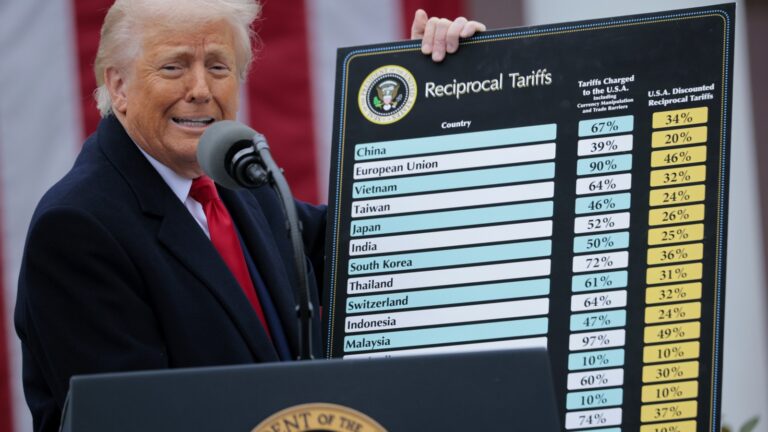➡️ To learn more how tariffs work and why today’s tariffs may be harmful to the American economy, see How do tariffs work, and who will they impact? from University of Chicago.
You’ve probably heard plenty of reasons why President Trump’s tariffs will harm the global and domestic economy while raising prices for critical goods. That means the price of your $10 emotional support plushie from China will now be $24.50. Even the majority of economists agree the tariffs are a terrible idea, pointing out that even if they were revoked, the global uncertainty and distrust they’ve stirred alone might have dealt an irrevocable blow.
One of the intentions behind the tariffs is to decrease our economy’s reliance on other countries and turn inwards to domestic manufacturers instead. Having more “Made in America” rather than “Made in China” goods and services around sounds pretty patriotic and prideful in theory. Even some progressive Democrats want to reshore manufacturing, although they don’t believe tariffs are the answer.
While this economic nationalism is emotionally understandable, a lot of us know that this is just as unrealistic as you marrying your celebrity crush when you’ve got the sex appeal of elevator music. These tariffs have been notably hitting small businesses like asteroids to the earth.
From what I’ve been hearing from American business owners and economists, the common theme I’ve observed is that proponents of tariffs just don’t realize that the domestic economy is just too deeply reliant on foreign manufacturing and exporting to realistically back out of.
Besides the catastrophic impact on everyday consumers, here’s a few reasons why these tariffs are so bad:
Tariffs might not work as intended. We just don’t have enough resources alone to manufacture what we want
You already know that “Made in America” entails drastically higher manufacturing costs due to higher human labor costs. But there are several other factors impacting these costs: several American manufacturers typically rely on raw materials from abroad to produce their equipment and use parts imported from other countries. This includes steel and aluminum primarily sourced from Canada, since the US doesn’t produce enough to meet demand. While proponents of tariffs want this to change, that’ll take a while — you can’t exactly construct a bunch of steel mills overnight. That’s why even the patriotic automaker Ford only gets 42% of its parts from Canada or the US.
Even if you could, the equipment used in American manufacturing and other critical industries are often made of several components that just can’t be produced in the US because nature said so. This particularly includes rare earth elements used to make magnets, car motors, solar panels, TVs, and several other everyday items you can’t live without. These elements are just much more abundant in other countries, especially China mining 90% of the world’s supply. The US only has one mine, which means a domestic shortage is under way.
We won’t be able to find the best workers
China in particular has been antagonized by tariffs (which the US may slash in half to ease tensions) in order to curb some of our reliance on their manufacturers. But aside from amplifying labor costs, the main struggle 21% of businesses will face is actually finding skilled labor. That’s why reshoring apparel manufacturing might be a dead end: the only Americans who know how to work those machines aren’t exactly of working age anymore.
It makes sense that this country hasn’t put much effort into training skilled manufacturing staff in the last seven decades of primarily relying on other countries for that. I know some of you would quit your jobs immediately if your celebrity crush promised to take care of the money forever, so don’t act like you’re any better.
Experts predict that the manufacturing jobs that’ll open up domestically will require certifications and training, which might be one reason why there are currently more open manufacturing jobs than Americans trying to fill them. Trade apprenticeships typically take around four years to complete. That’s also how long semiconductor fabrication plants typically take to finish building.
It looks like reshoring manufacturing won’t give us the same manual jobs of the 1950s that some economists suspect tariff supporters are nostalgic for. The jobs most resembling those are likely to be automated.
I have a few family members currently working in manufacturing here in California, most who have engineering degrees or other certifications like AutoCAD. When I opened up the books they had to study, I wasn’t sure if I was still reading English.
A more prepared labor force is another reason why Apple manufactures iPhones in China beyond just saving money on labor. As for saving money — manufacturing it in China with these tariffs might still be more affordable than doing it in the US. So much for incentivizing reshoring.
The US rejecting the support of other countries is reminiscent of that one traumatized friend suddenly cutting off the whole friend group for the sake of their glow-up journey, thinking “I’ll be stronger if I fend for myself”. Which means resorting to questionable self-help books and watching The Wolf of Wall Street religiously rather than opening themselves up to community support, therapy, or receiving memes. Even if they eventually crawl out of the rabbit hole and beg the group chat for forgiveness, how easily would you trust them again?
Too many American jobs are dependent on global trade
As intended, the tariffs are indeed lowering the demand for foreign goods. But until those can be sustainably and comfortably replaced, businesses have been experiencing profit-disrupting disturbances to their supply chain. Industries directly responsible for supply chains have been unsettled by massive drops in demand, such as Southern California ports experiencing 44% less freight from China compared to last year.
Retaliatory tariffs have lowered demand for US goods by other countries, harming businesses heavily dependent on exports such as agriculture. This drop in activity is predicted to lead to major layoffs for employees such as truckers, warehouse workers, and dockworkers. Some businesses have already started layoffs, shrinking down to a quarter of their former size. Even your fat-shaming aunt who calls you Shrek wouldn’t want you shrinking as dramatically as many businesses sadly will be.
When tariffs worked, the economy wasn’t as globally interdependent
Some proponents of tariffs point out the days when they actually boosted the economy. However, these days weren’t as socially or economically globalized, which is a major reason why tariffs weren’t so harmful back then. We just didn’t have the advanced planes, ships, or immigration for today’s degree of global trade and immigration.
Similarly to today’s intentions, tariffs were implemented to protect American industries from foreign competition and raise money, successfully accounting for 50-90% of federal revenue between 1860 and 1913. However, these high proportions only existed before the government came up with other ways to raise revenue, such as income taxes. That’s why they only accounted for 1.57% of federal revenue in 2024.
The tariffs of the 1930s also provoked retaliatory tariffs, which shrunk the volume of global trade and further exacerbated the Great Depression. The Great Depression was mainly caused by other factors that made it harder for Americans to spend and invest, which consequently impeded business creation and growth. 2025’s tariffs are leaving a similar impact by disrupting supply chains, which is likely to discourage the creation of new businesses and disrupt hiring for established businesses.
Other proponents of tariffs support their usage to heckle other countries to do the president’s bidding, such cracking down on fentanyl trafficking. In a different way, this also reinforces the failure to realize how dependent this country is on the rest of the world. You know that no matter how irked you are at your dusty roommate asking you to rate their questionable White Lotus fanfiction, it’s wise to handle it kindly if they’re financing your inescapable Yankee Candle addiction.
Well, at least a new recession means more of that escapist “we’re gonna set this dance floor on fire” pop bangers like it’s 2008. Only it’ll be a lot harder to buy new cute outfits to flex on the dance floor, since tariffs might also raise clothing prices to be triple that of 2008’s garish going-out tops and chunky necklaces.
Will being more self-reliant have any positive impact?
If we’re lucky, there may be a few diamonds in the rough. Several US companies such as Chobani and Johnson & Johnson are investing billions into domestic manufacturing, opening new facilities. Attempts to open up new rare earth mines are under way, but it’s unlikely they’ll produce enough to meet demand.
Back when Ford invested $350 million in its domestic plants in 2017, it created or retained about 800 jobs. Hopefully the other companies can do better.
Some unions actually support the tariffs, claiming they’ll help reshore manufacturing jobs and curb the free trade that’s harmed the working class. Tariffs also intend to strengthen national security by not having sensitive materials produced abroad where they can be hijacked by foreign threats, although that hasn’t helped in the recent past.
The few proponents of tariffs out there believe this economic devastation is necessary for a grand resurgence, like a phoenix rising from the ashes.
“It’s always darkest before the dawn,” they might say. It would be fantastic if that’ll apply here, but the future looks pretty bleak. Even if a new dawn rises, it’ll probably look like that one eerie day in 2020 when the San Francisco skies turned orange from wildfire pollution.
“Made in America” is a source of pride, but what else can be?
I understand the need for more accessible pathways to middle-class livelihoods for Americans without college degrees. But forcing it out of us with tariffs just isn’t realistic when we’ve been relying on exploiting the world for this long. It’s giving the same vibe as that friend trying to glow up by suddenly eating nothing but 11 grapes, a Capri-Sun, brussels sprouts, and a chicken wing rather than gradually easing into a balanced diet.
The desire for and attempts to reshore manufacturing is hardly exclusive to Republicans: Democrats have also introduced policies intended to gradually do so such as the 2024 Modern Steel Act to build new iron and steel plants in deindustrialized towns. It makes sense that providing more solid opportunities for the working class would be quite a prideful, patriotic accomplishment and boost socioeconomic equality.
But you know what else I think would also help us be prouder of this country? Not screwing over the majority of the country and its businesses for the sake of unrealistic self-sufficiency and uncertain job creation. The humility and realism to accept that some other countries are just better equipped to produce what we want. The diplomacy in resolving international conflicts and get along peacefully with other countries without trade wars. The innovation in finding alternative, less harmful ways to boost the economy and create a variety of attainable jobs. (Like actually training Americans for attainable, modern manufacturing jobs before deciding on tariffs.)
And of course, the acceptance that it’s okay for this country to get some help from the world in assembling our creative visions. Is the pride in our own originality, innovation, and hard work not enough? Is paying double for your emotional support plushies and showerheads worth the extra patriotism?
📣 You can protest the tariffs online at 5 Calls.



